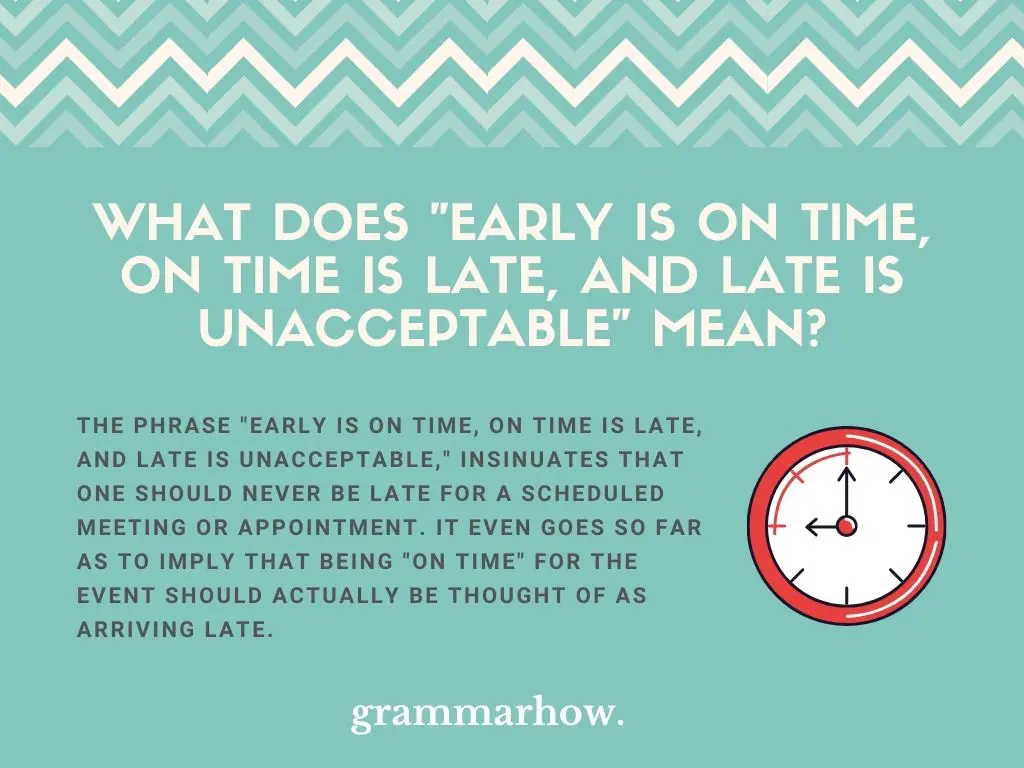You may have heard the popular saying “Early is on time, on time is late, and late is unacceptable,” in your everyday conversation with friends or among your colleagues. Have you ever wondered about its origination or what it implies? This article further explains and helps you to gain insight into this expression.
What Does “Early Is On Time, On Time Is Late, And Late Is Unacceptable” Mean?
The phrase “Early is on time, on time is late, and late is unacceptable,” insinuates that one should never be late for a scheduled meeting or appointment. It even goes so far as to imply that being “on time” for the event should actually be thought of as arriving late.

The phrase also clearly states that there is not an acceptable reason for ever being actually late and ultimately suggests that the only really justifiable time to arrive for a scheduled meeting or event is to arrive there a bit early.
What Is The Origin Of “Early Is On Time, On Time Is Late, And Late Is Unacceptable”?
There are various opinions regarding the exact origin of the phrase “Early is on time, on time is late, and late is unacceptable,” but a good consensus of people claim that it was coined by the author Eric Jerome Dickey in his book “Sleeping With Strangers” published in 2007.
Some others believe that it may have originated even earlier, even as far back as the 1800s in factories and textile mills and others claim to have definitely heard it used in their days in the military.
No doubt there have been documented variations of it used earlier than Jerome’s book, but whether he uniquely coined the phrase or not, the quote is often attributed to him.
There has, however, been documented earlier adaptations of the quote published as far back as the 1980s in several books and copies of the Reader’s Digest.
It is also interesting to note that the phrase seems to be quite commonly used within the United States and is less common in the UK or other geographic areas. Many who use the phrase claim that they first heard it from their parents or caretakers growing up and carried with them as adults.
Whatever the true origin, the phrase is quite popular, and often used in motivational speaking and business and educational coaching.
What Is The Origin Of “5 Minutes Early Is 10 Minutes Late”?
The phrase “5 minutes early is 10 minutes late,” is a common variation of the previous phrase. It is also difficult to find exactly where it originated, but the famous American football coach Vince Lombardi seems to be the person attributed with saying the closest variation to it.
The quote that Lombardi said was, “If you are five minutes early, you are already 10 minutes late.” Strangely enough, a first glance at the quote seems to be quite contradictory, but the core message about lateness remains the same as the previous quote.
The implication with this quote is that it is never acceptable to be late. It is important to note that if you consider it a variation of the Lombardi quote, it would have been around since the era of the 1960s.
Clocks were different (and manually set) in that era and there was a good chance that different clocks would show a slightly different time. Therefore, if you showed up “on time” according to your clock, you could actually be “late” according to the clock of the person you were meeting.
Of course, in modern times, most clocks are digital and set automatically to sync up with your network or set time zone. So your clock will more than likely match up with the time on the clock of the person you are meeting.
Still the phrase remains quite common as a motivational tool and a personal motto for many.
Is It Better To Be Early Or On Time?
Based on both of the common phrases that we have explored in this article, it appears that the overall consensus remains that it is better to arrive a bit earlier than you need to than strive to be exactly on time.
The reason that being “on time” can be interpreted as being “late,” lies with the fact that when you have an agreement to be somewhere you are always working within someone else’s time.
So if you show up at a meeting at the exact time it is set to be scheduled, you could be viewed as unprepared, rude, or inconsiderate, even though you could rightfully say that you are “on time.”
This perception is particularly true if you are the last to arrive in a group or if the person that you are meeting has been waiting for you to get there (having arrived a few minutes early themselves).
Additionally, you could encounter an unexpected circumstance on your way and it could easily turn your “on time” arrival to one that is actually late.” If the person you are meeting is a stickler for punctuality, showing up late could cause a bad first impression (or even a bad repeated impression).
Therefore, like the two quotes we discussed imply, it is better to “be early” and adopt that rule as your personal directive to follow for what it means to be “on time.”

Martin holds a Master’s degree in Finance and International Business. He has six years of experience in professional communication with clients, executives, and colleagues. Furthermore, he has teaching experience from Aarhus University. Martin has been featured as an expert in communication and teaching on Forbes and Shopify. Read more about Martin here.
